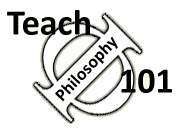Teach Philosophy 101
Free resources for
philosophy teachers!
"One of the most comprehensive, well-researched, and accessible guides for teachers that I have ever seen." James Lang, Chronicle of Higher Education (read full review of TΦ101)
Tests
Advantages of Tests:
-
Motivation. Tests motivate students to study the material.
-
Assessment. Tests provide a way for instructors to measure student learning.
-
Retention. The act of studying for a test helps students retain and understand the material. Suppose, for example, the student reads Plato's Apology in September; by December, now that the student is reading Sartre, the Apology is a distant memory. Studying for the final exam creates an environment where the student must think about Plato and Sartre together. The act of revisiting the earlier learning also helps the student retain the information. Some instructors disdain tests and rely solely on papers because tests primarily focus on lower level thinking. TΦ101 does not agree, arguing the act of studying for a test, regardless of how valid the test is, is a positive learning experience for students.
Types of Test:
-
Short-answer, objective questions. These may be short definitions, identifications, or multiple-choice. They are easy to grade and can be used to cover a lot of content, but focus primarily on memorization and can lend themselves to cheating (Clegg and Cashin). Steve Daniel of Texas A&M has a list with with over 1000 (scroll to appropriate section).
-
Essay tests. These can and should focus on higher order skills, but take more time to grade, can only focus on a limited amount of content, and are also subject to inconsistencies (even the same grader will give different grades to the same essay at a later point) (Cashin).
-
Combinations. Many people combine short-answer and essay questions, and as you will see from the examples, there are dozens of different ways to test.
-
The Texas Tech Learning and Technology Center has a fantastic website with principles for creating tests and links to other helpful sites.
Helping Students to Study:
Students often complain that they "don't know how to study for a philosophy test." TΦ101 believes that it is very important to give students some direction in how to study for the test. One strategy, adopted by many teachers, is to select the final test questions from a much longer list, which is distributed to students in advance. So for example, the study guide might be long enough to include questions on virtually everything that the instructor wants the students to know or to think about. Students will study for the test by preparing answers to the study questions. This form of testing has a number of advantages, one of which is that it is very easy to develop make-up tests, merely by selecting a different batch of questions. Often students will prepare by working in groups; although, in general, students learn more by working in groups, this can provide an opportunity for some students to be "free riders" and take advantage of the hard work of others.
Final Exams:
Final examinations, of whatever style, deserve special consideration. TΦ101 favors cumulative final examinations, without which students may not have a chance to review all of the material covered in a semester in order to make connections. TΦ101 objects to the practice of excusing students who are doing well from taking the final. This seems extremely unfair to weaker students; if anything students who expect a high grade should be expected to do more work than weaker students, not less. Final exams are not a good place to experiment with new types of questions. Psychologist John Ory has an excellent discussion of exam strategies and Rob Weir has some good tips and resources for finals.
Sources:
Cashin, William E. "Improving Essay Tests." IDEA Paper no. 17, January 1987. 10 December 2007 https://www.ideaedu.org/Portals/0/Uploads/Documents/IDEA%20Papers/IDEA%20Papers/Idea_Paper_17.pdf
Davis, Barbara Goss. "Quizzes, Tests, Examinations." University of California Berkeley 15 July 2012
Clegg, Victoria L, William E. Cashin. "Improving Multiple Choice Tests." IDEA Paper no. 16, September 1986. 11 December 2007 https://www.ideaedu.org/Portals/0/Uploads/Documents/IDEA%20Papers/IDEA%20Papers/Idea_Paper_16.pdf
Ory, John C. "The Final Exam." Association for Psychological Science Observer, 16:10, October 2003.
Texas Tech Teaching Learning and Technology Center, "How do I create tests for my students,"30 June 2011. http://www.depts.ttu.edu/tlpdc/Resources/Teaching_resources/TLPDC_teaching_resources/createtests.php
Weir, Rob. "Having the Final Say." Inside Higher Ed. 7 December 2009.
Author: John Immerwahr
Update: October 11, 2015 (E. Tarver)
